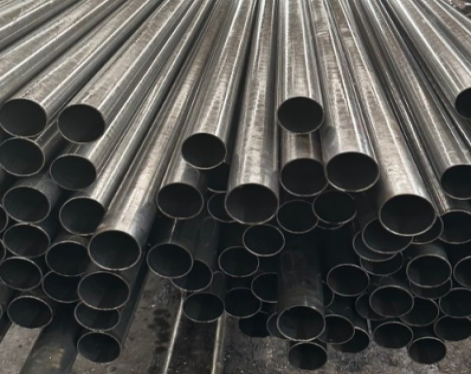Seamless steel pipe (SMLS) is a steel pipe without welded joints made from a whole steel billet or through multiple processes such as rolling and stretching. It is widely used in petroleum, chemical, aviation, materials and other fields with its excellent properties such as high strength, wear resistance, corrosion resistance and high pressure resistance.
The material composition of seamless steel pipe mainly includes the following chemical elements:
Carbon (C): Carbon content is one of the main elements affecting the performance of seamless steel pipe. Different carbon contents will lead to changes in the hardness, strength, toughness and other properties of steel. The higher the carbon content, the higher the strength of the steel pipe, but the plasticity and toughness will decrease. Generally, the carbon content in seamless steel pipe is between 0.08% and 0.25%.

Silicon (Si): Silicon can improve the corrosion resistance and heat resistance of seamless steel pipes, and can improve the fluidity of steel, but it will also reduce the plasticity and toughness of steel. The silicon content is generally between 0.17% and 0.37%. In precision seamless pipes, the silicon content is usually controlled within a certain range to balance its mechanical properties and processing properties.
Manganese (Mn): Manganese is an important deoxidizer and desulfurizer in steel, which can improve the strength and hardness of steel, while improving the toughness and impact resistance of steel. In precision seamless steel pipes, the manganese content is also precisely controlled.
Sulfur (S): Sulfur is generally regarded as a harmful element in steel because it reduces the plasticity and toughness of steel and increases the brittleness of steel. However, in precision seamless steel pipes for certain specific purposes, such as free-cutting steel, sulfur is added in appropriate amounts to improve its cutting performance.
Phosphorus (P): Phosphorus is also regarded as a harmful element in steel because it reduces the plasticity and toughness of steel and increases the cold brittleness of steel. In the production of precision seamless steel pipes, the phosphorus content needs to be strictly controlled.
Chromium (Cr): Chromium is an important element for improving the corrosion resistance and heat resistance of steel. In alloy steel precision seamless steel pipes, the appropriate addition of chromium can significantly improve its corrosion resistance and high temperature performance.
In addition to the above main elements, the material of seamless steel pipes may also contain other alloying elements, such as molybdenum (Mo), nickel (Ni), tungsten (W), etc., to improve their specific properties. The content and type of these alloying elements will be precisely adjusted according to the specific use and performance requirements of the steel pipe.
Conclusion:
The chemical composition of seamless steel pipe is one of the important factors affecting its performance. When producing seamless steel pipes, we need to adjust its chemical composition according to its use and performance requirements to achieve the best performance indicators. At the same time, for users, when selecting seamless steel pipes, they can also uate their quality and performance according to their chemical composition to ensure that they meet the requirements of use.
The material composition of seamless steel pipe mainly includes the following chemical elements:
Carbon (C): Carbon content is one of the main elements affecting the performance of seamless steel pipe. Different carbon contents will lead to changes in the hardness, strength, toughness and other properties of steel. The higher the carbon content, the higher the strength of the steel pipe, but the plasticity and toughness will decrease. Generally, the carbon content in seamless steel pipe is between 0.08% and 0.25%.

Silicon (Si): Silicon can improve the corrosion resistance and heat resistance of seamless steel pipes, and can improve the fluidity of steel, but it will also reduce the plasticity and toughness of steel. The silicon content is generally between 0.17% and 0.37%. In precision seamless pipes, the silicon content is usually controlled within a certain range to balance its mechanical properties and processing properties.
Manganese (Mn): Manganese is an important deoxidizer and desulfurizer in steel, which can improve the strength and hardness of steel, while improving the toughness and impact resistance of steel. In precision seamless steel pipes, the manganese content is also precisely controlled.
Sulfur (S): Sulfur is generally regarded as a harmful element in steel because it reduces the plasticity and toughness of steel and increases the brittleness of steel. However, in precision seamless steel pipes for certain specific purposes, such as free-cutting steel, sulfur is added in appropriate amounts to improve its cutting performance.
Phosphorus (P): Phosphorus is also regarded as a harmful element in steel because it reduces the plasticity and toughness of steel and increases the cold brittleness of steel. In the production of precision seamless steel pipes, the phosphorus content needs to be strictly controlled.
Chromium (Cr): Chromium is an important element for improving the corrosion resistance and heat resistance of steel. In alloy steel precision seamless steel pipes, the appropriate addition of chromium can significantly improve its corrosion resistance and high temperature performance.
In addition to the above main elements, the material of seamless steel pipes may also contain other alloying elements, such as molybdenum (Mo), nickel (Ni), tungsten (W), etc., to improve their specific properties. The content and type of these alloying elements will be precisely adjusted according to the specific use and performance requirements of the steel pipe.
Conclusion:
The chemical composition of seamless steel pipe is one of the important factors affecting its performance. When producing seamless steel pipes, we need to adjust its chemical composition according to its use and performance requirements to achieve the best performance indicators. At the same time, for users, when selecting seamless steel pipes, they can also uate their quality and performance according to their chemical composition to ensure that they meet the requirements of use.









